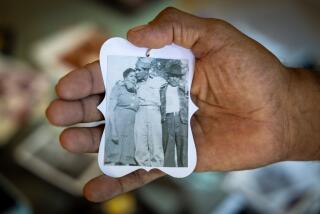Urban Peacock Finds a Roost in Hawthorne : It’s Not the Peninsula, but It’s Home
- Share via
HAWTHORNE — Harvey the peacock, banished from the posh Palos Verdes Peninsula, has found the good life on the grittier streets of this working-class city.
Harvey arrived here about a year and a half ago and lost little time acquiring the tastes of a sophisticated urbanite: He prefers popcorn, cat food and sliced bread to birdseed.
He also developed the street smarts needed to survive--evading with equal agility the neighborhood kids chasing after his resplendent tail feathers and the Humane Society, on the trail of its former captive.
Harvey’s habitat is as urban as it gets in Southern California. His roost in the 12900 block of Doty Avenue is less than a block from El Segundo Boulevard with its 36,200 cars a day. Around the corner is a lumberyard, a liquor store and the A-1 Smog Check. Across El Segundo is Northrop Corp.’s massive Aircraft Division with its 11,200 employees.
Bird Watched
But residents in this neighborhood of modest houses tucked among small apartment buildings watch out for Harvey.
“Everybody is feeding him,” said Art Martinez, 37, a machinist at the Mobil Refinery in Torrance. “We and the neighbors went haywire when he shed.” Martinez’s son Jason, 7, kept several of the blue-and-gold plumes.
“He flies from roof to roof. It is just beautiful,” said Jose Aranda, 33, a Thiem Industries machinist.
Harvey flew into this neighborhood after escaping from the clutches of the Southern California Humane Society, which had trapped him on the Palos Verdes Peninula.
Sharon McGee has sort of adopted the peacock, feeding it twice a day along with her 13 cats, who know better than to tangle with Harvey. McGee, administrative secretary at Beverly Glen Hospital, the most outspoken advocate of the 3 1/2-foot bird, is the one who gave him his name.
“Lots of times when I see the kids running at him, I go out and holler at them,” McGee said. “Sometimes, I feel he belongs to me, although I know he belongs to the whole neighborhood. Anybody new to the neighborhood, I tell them to watch out for the peacock.”
Mating Cries
During the mating season, Harvey cried loudly, without success, for a companion. “At first, I thought it was a truck going by,” Martinez said.
McGee worried that people would complain.
“He starts screaming at 4 a.m. and he stops at 8 a.m.,” she said. “I expected people to complain, but nobody said a word. After his season was over, several of the guys came over and said, ‘Did something happen to the peacock?’ ”
“Sometimes he makes a lot of noise,” Aranda said, “but it doesn’t bother me.”
Neighbors in Hawthorne are horrified at the thought that the poisoning deaths of 11 peafowl in Palos Verdes Estates last month may have been intentional.
“Why do they do that?” Aranda said. “I wish we had more than one. . . . We are poor people. Just let me hit the jackpot and I will buy a Mercedes and move to Palos Verdes where I can watch peacocks any time I want.”
“Nobody here wants to poison them,” McGee aid.
Peninsula Refugee
Harvey arrived in Hawthorne as a refugee from the long-running battle between pro- and anti-peafowl forces on the Peninsula. In 1984, Harvey was one of 51 peafowl captured during a seven-month trapping campaign in Palos Verdes Estates. He was taken to the Southern California Humane Society facility in Hawthorne. The idea was to set the peafowl free in Big Tujunga Canyon in the northeast San Fernando Valley.
How Harvey escaped is not certain. The two attendants responsible for the society’s holding pen no longer work there. By the time he managed to get to his current home, his marvelous but fragile tail and head feathers had been broken off, possibly the result of his struggle to free himself, humane officials said.
Humane Officer Christine Whiteside was sent to bring in the escapee.
“I was out there every other day,” she said.
But she was no match for Harvey. No sooner would she climb up to a roof than Harvey would fly off to another.
“It is a very smart peacock,” Whiteside said ruefully. “Having been trapped before, it will not be trapped again.”
Private Preserve
McGee said she will not permit the Humane Society on her property, which Harvey apparently views as his private preserve.
“I will not let them in my yard and that is where he will end up when people are chasing him,” she said.
A truce of sorts has resulted.
Humane society Sgt. Douglas Buck said the organization has not received any complaints. “Unless we hear otherwise from the city attorney, we wouldn’t pursue the matter,” he said.
Whiteside, the Humane Society trapper, has no inclination to return for Harvey, whose regrown tail was displayed in all its splendor this summer.
“He is being fed well,” she said. “He seems to like where he is at.”
More to Read
Sign up for Essential California
The most important California stories and recommendations in your inbox every morning.
You may occasionally receive promotional content from the Los Angeles Times.













